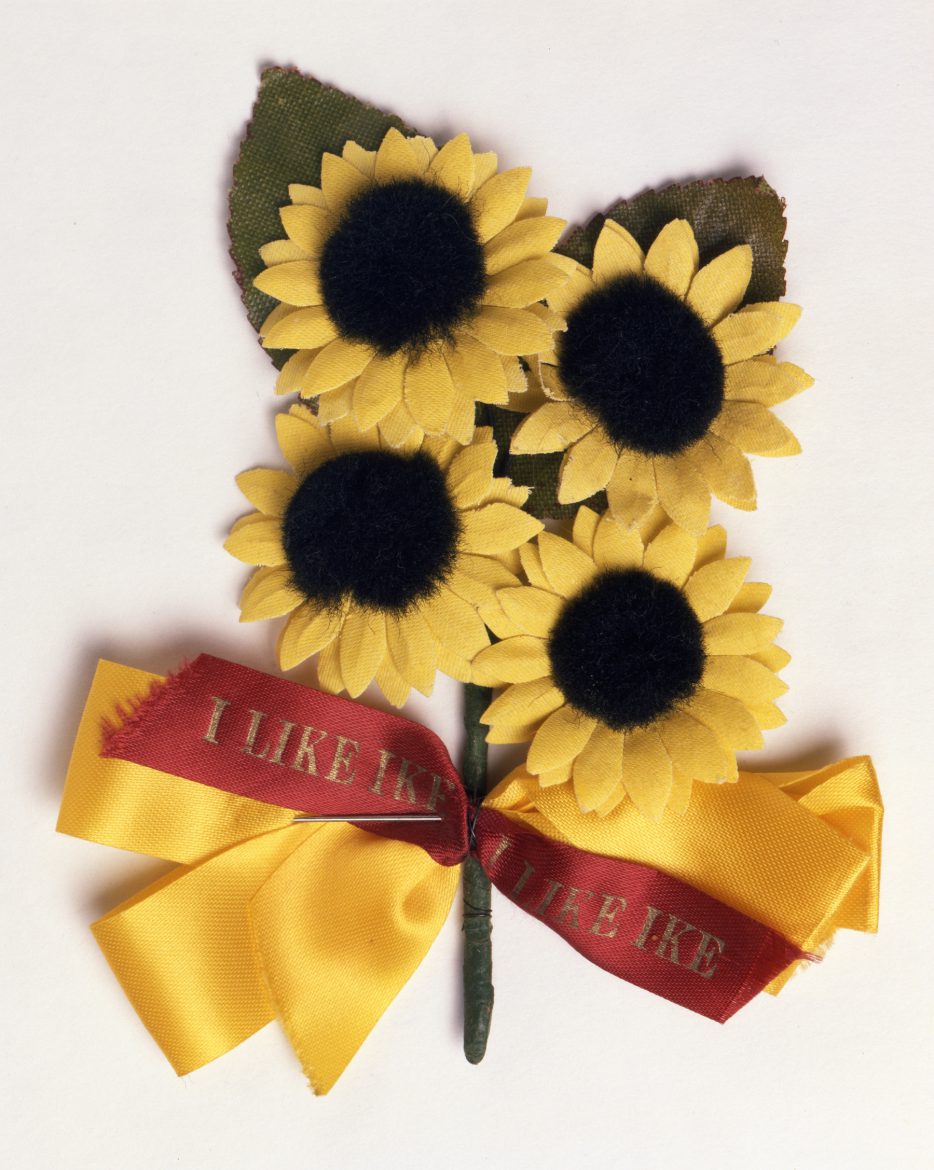
Lapel Pin, “I Like Ike,” Hancock, MA, 1956. Shaker Museum | Mount Lebanon, 1987.1.1. Michael Frederick, photographer.
As the election season is upon us we thought we would share an object from our collection and some thoughts on the Shakers and their relationship to the federal government. This pin was probably produced for Dwight D. Eisenhower’s 1956 presidential campaign. It was owned by Shaker Eldress Frances Hall (1876-1957). Eldress Frances, from age […]
As the election season is upon us we thought we would share an object from our collection and some thoughts on the Shakers and their relationship to the federal government.

Lapel Pin, “I Like Ike,” Hancock, MA, 1956. Shaker Museum | Mount Lebanon, 1987.1.1. Michael Frederick, photographer.
This pin was probably produced for Dwight D. Eisenhower’s 1956 presidential campaign. It was owned by Shaker Eldress Frances Hall (1876-1957). Eldress Frances, from age eight until her death, lived at Hancock, Massachusetts. She served there as a Trustee and assistant to Ministry Elder Joseph Holden. She eventually rose to being first in the Shaker Ministry in 1946 and it was she who made the final decision to close the Mount Lebanon community in 1947 and move the Shaker Ministry to Pittsfield in 1950.
The pin was a gift from Eldress Frances to young James Upton, son of Russell Sage College professors and Shaker collectors Charles and Helen Upton. The Uptons became friends with the Eldress in the early 1950s and she was fond of Jim. In 1957 she gave this pin to Jim during his first year of collecting political memorabilia. Jim made a gift of the pin to Shaker Museum | Mount Lebanon in 1987.
Whether Eldress Frances ever wore the pin or if she supported Eisenhower and voted for him is unknown; that she had the pin suggests some interest in his election.
In general Shakers didn’t vote. Voting encourages people to take sides – as the Shakers would say, “get into a party spirit” – and taking sides creates disunion. Dwelling on issues that are raised in political discussions gets Shakers too involved in the concerns of the outside world. The Shakers were not at all anti-government or anti-democracy. In fact, Elder James S. Prescott of the North Union, Ohio, Shakers wrote, “The ‘ballot’ is one of the best institutions the world [meaning those who are not Shakers] have to preserve order on the earth plane, where the laws of voting, and the ballot box is kept sacred, and not perverted to a wrong use. The world have a right to the ‘ballot,’ it is their privilege to vote,” in an article in the February 1885 issue of The Manifesto. He continued to explain, however, “There is no law requiring every citizen of the United States to vote, because he is a citizen, and it is right it should be so, otherwise our country would not be a free country.” Shakers chose not to vote. Prescott gets to the heart of the matter by telling a story of an Elder at Union Village, Ohio: “’Brethren! Are there any parties among you?’” asked the Elder, ‘If so, I will tell you just which side I will join. Neither! Christ is not divided. His people are called to be one people, of one heart, and of one mind.’”
Frederick W. Evans, Elder of the Mount Lebanon North Family made the same point in an article titled, “Why Do Not Shaker Vote?” published in The Shaker Manifesto (October, 1880), answering the question with, “For the same reason that they do not marry, nor fight, nor hold individual private property. They are a church, not connected with any civil government; do not believe in church and state union, not even with the American republic.” In the same article Evans stresses that the American system will not be a perfect system “until their Shaker sisters are equally citizens with themselves [the brethren] – until woman is not only a law-abiding but a law-making factor.” So, the article might be re-titled, at least, until women’s suffrage in 1917 – “Why Do Not Shaker Men Vote?”
The Shakers did occasionally find reason to vote in local elections and on referendums where they were of one mind and the issue directly involved them. After all, they paid taxes and made use of the civil authorities that those taxes paid for when it was necessary. Following the Civil War some of the communities relaxed their restrictions on voting and members were allowed to cast their ballots.